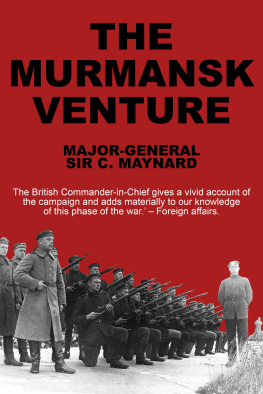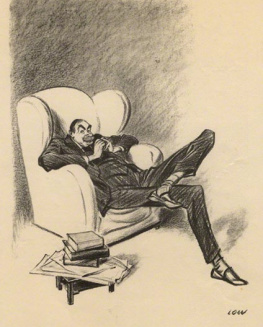The Murmansk Venture
Major-General Sir C. Maynard
Charles Maynard, 1928
Charles Maynard has asserted his rights under the Copyright, Design and Patents Act, 1988, to be identified as the author of this work.
First published in 1928 by Arno Press.
This edition published in 2016 by Albion Press Ltd.
Table of Contents
Preface
Since my return from North Russia in the autumn of 1919, friends have urged me on many occasions to compile and publish a record of the doings of the Murmansk Force.
They argued that no account of its activities had been or appeared likely to be written, and that, of all our military undertakings, there was none regarding which greater misconception existed in the mind of the general public. Moreover, the campaign, even if of minor importance in its purely military aspect, was in many ways unique; seeing that it was carried out by one of the most motley of forces ever created for the purpose of military operations, and under climatic conditions never experienced previously by British troops. Further, those responsible for its conduct had found themselves enmeshed by a skein of political intrigue so complex and tangled that many of its threads remained yet unravelled. Could there be a doubt, therefore, that its history would prove of interest to the many thousands who, wondering at the time why we had gone to North Russia and what we had hoped to accomplish there, were left wondering still?
Whilst admitting the general truth of my friends arguments, I have nevertheless been averse hitherto from undertaking the task they suggested: for there were reasons which, to my mind, rendered it inadvisable that any early account of the enterprise should be published.
There might, for instance, be a danger, however slight, of incriminating further in the eyes of Moscow those Russians still living who, having thrown in their lot with the Allies, had declined to accept the opportunity offered them of seeking an asylum outside their own country.
Moreover, feelings in England in connection with our attitude towards Russia ran exceedingly high for a considerable period after the termination of hostilities, and it appeared inopportune for a serving soldier to publish an account of the operations of a force the employment of which was still causing much bitter political controversy.
Nearly nine years, however, have now elapsed since our withdrawal from the Murman Area, and it cannot be doubted that the question of the safety or otherwise of those Russians who took part in our joint effort to reconstitute their country, and who remained to face the consequences, has been answered long ere this.
Political disputations as to our relations with Russia are still, it is true, of frequent occurrence. But these deal with the future rather than with the past; and our action in 1918-19, though not forgotten, is now employed but rarely on the political platform as a cudgel wherewith to belabour an opponent.
I feel justified therefore in concluding that such objections as existed in my mind originally may now be disregarded and of this conclusion the present volume is the outcome. As will be evident, it lays no claim to anything in the nature of a detailed report: nor has any effort been made to draw strategic or tactical deductions, with a view to their consideration by the military student. My aim has been merely to tell a tale of a boldly conceived venture, wherein we, as a nation, played a part of which we have no cause to feel ashamed.
Chapter I Why We Intervened in Russia
What were the reasons for our intervention in Russia in the spring of 1918?
If this question were put to a hundred average Britishers picked at random from various walks of life, it would, in all probability, elicit from no single one of them a really intelligent and accurate reply. A few there might be whose answers would show a partial appreciation of our aims; but, of the remainder, some perhaps would assert that we had no valid reason at all, and that the whole undertaking was mad and motiveless; whilst others, constituting in all likelihood the majority, would hold that we had intervened solely for the purpose of overthrowing the Bolshevik rgime.
Even should the above be regarded as an overstatement, it is beyond dispute that widespread ignorance exists with regard to the objects we had in view when first we decided to despatch troops to Russia; and until this is replaced by an understanding of the motives by which we were actuated, no clear idea can be formed either of the task originally entrusted to the Murmansk Force, or of its activities under the altered conditions with which it was afterwards confronted.
Our motives, however, cannot be grasped fully without a study of the military situation as it existed at the opening of 1918.
At this time both France and England had tapped their respective resources in man-power almost to their limits, and the armies of both nations were not only dispirited, but nearing a state of exhaustion. Italy was in even worse plight. For Caporetto had brought her nearly to her knees, and, pending her recovery, it was found necessary to lend her substantial aid, and thus weaken still further the strength of the Entente forces in France.
Germany, on the other hand, profiting by the disintegration of the Russian armies, was making a rapid transference of troops from east to west, and at the commencement of the year had withdrawn already twenty-three divisions from the Russian front.
The position of the Allies therefore was not reassuring; for the armed forces of America could not make their influence felt in France for many months to come, and before then Germany would be in a position to mass for offensive action on the Western front an ever-increasing proportion of her troops liberated from the Russian area.
It was thus imperative to consider what steps could be taken to prevent, or reduce to a minimum, the flow of German divisions from Russia to the west. Unless this could be achieved it was certain that, within a very short period, our exhausted troops would be subjected to so fierce an onset that its issue must in any case be regarded with misgiving, and might even result in our overthrow before the practical support of American backing could be forthcoming.
The most effective method of preventing Germany from transferring troops to the Western front would be the launching of a vigorous offensive elsewhere. But, unfortunately, there was no hope of being able to undertake in any theatre an offensive on the scale demanded.
There was, however, one possible means of bringing about the desired end, namely, the building up in Russia itself of a new Eastern front. Should this plan prove feasible, not only might it put a stop to the transfer from that front of further German forces, but it might also produce other results almost equally far-reaching.
Chief of these would be the denial to Germany of access to the vast material resources of Russia, the exploitation of which would enable her to regard almost with equanimity our naval blockade, at that time commencing to make its pressure a very real factor in the struggle.
There was, too, another danger which the constitution of the new front might well hope to avert.
It was known that Germany was pressing northwards through Finland towards the ports of Murmansk and Petchenga, with a view to establishing new submarine bases.
Murmansk was ice-free throughout the year, was connected by rail with Petrograd, and possessed already many of the conveniences required for a submarine base.
Petchenga, though difficult of access on the land side, and partially ice-bound during the winter months, could nevertheless be utilized for submarines during a portion of the year. Both were so situated that submarines operating therefrom would find our North Sea mine-fields no bar to their activities in the Atlantic and that just at a time when the transportation of American troops to France would be in its full tide.













